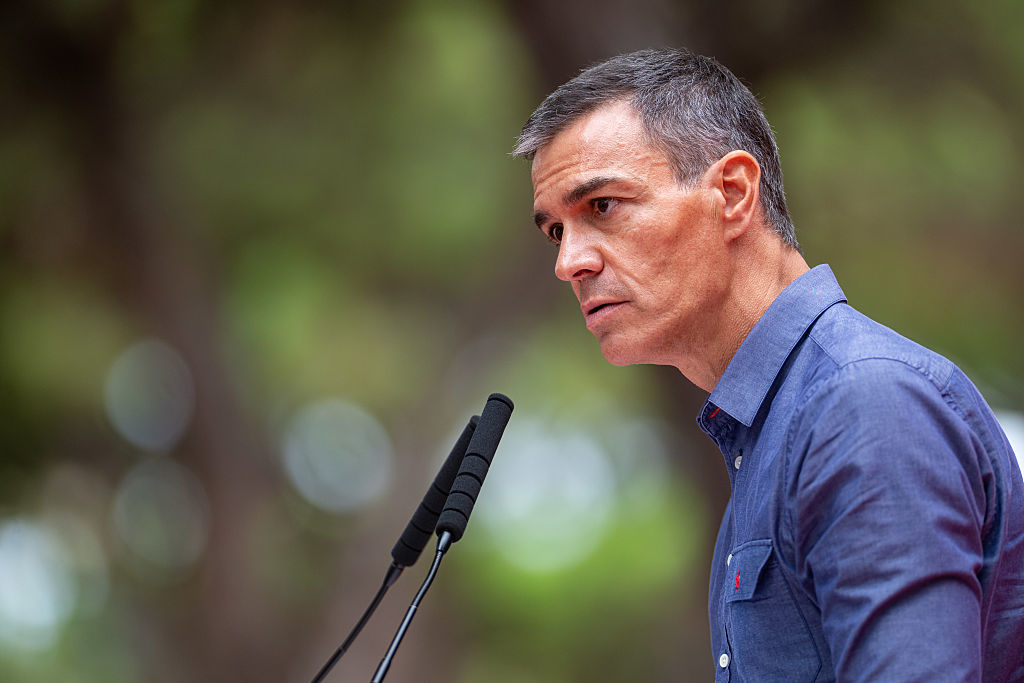Pedro Sánchez, Spain’s Socialist prime minister, has demanded that the regions of Aragon, Asturias, the Balearic Islands and Madrid – most of which are governed by the Conservative People’s party (PP) – compile lists of doctors who refuse to perform pregnancy terminations. Isabel Díaz Ayuso, the PP president of Madrid, has refused to publish what she calls a ‘blacklist’. The move is part of Sanchez’s plan to make abortion a constitutional right, following the example set by France last year.
Abortion has been legal in Spain since 1985, and in 2010 the 12-week rule, which allowed women to receive pregnancy terminations without having to give a reason, was increased to 14 weeks.
Sánchez has substantially changed Spain’s abortion laws since coming to power, removing the need for women aged 16 and 17 to secure parental permission, freeing women from the obligation to receive medical advice and making the procedure available in public hospitals (although most are still performed within the private sector). He insists that there is still more to be done in ‘defence of women’s freedom and autonomy’. But that won’t be achieved by shaming anti-abortion doctors with a blacklist.
Practically speaking, a registry of moral objectors to abortion seems pointless. In a country in which only about 200 clinics offer pregnancy terminations, it would make more sense to publish a list of doctors who do perform the procedure. Indeed, some of this information is already made available by the Association of Accredited Abortion Clinics, although no individual professionals are named. As Manuel Martínez-Sellés, president of the Madrid College of Physicians, has said: ‘This is difficult to see as anything other than an attempt to restrict freedom of conscience [and] to discriminate against doctors who refuse to take part in acts they consider morally wrong.’
The right to conscientious objection is set out in Article 30 of the Spanish Constitution, although it is defined as exemption from military service. Sánchez’s hope seems to be that publishing lists of anti-abortion doctors will pressure at least some into performing the procedure. Abortions would thus become more widely available, but only at the cost of violating doctors’ right to conscientious objection.
Most of the regions have agreed to provide the objector lists within the three-month deadline. But Ayuso, the Madrid president, informed her leftist opponents that they should ‘go elsewhere’ for an abortion, prompting Alberto Núñez Feijóo, the PP’s national leader, to clarify the party’s position. Feijoo expressed his respect for ‘any woman who chooses to terminate her pregnancy… in accordance with the law’ – although this doesn’t explain why it’s almost impossible for women to find abortion clinics in PP-run regions. The credibility of Ayuso’s stance is undermined by the fact that Madrid has maintained a list of doctors who won’t perform euthanasia since 2021.
Sánchez’s proposal to make abortion a constitutional right was a response to a law passed recently by Madrid’s city council that requires women to be told about ‘post-abortion syndrome’, a pseudo-condition which is not recognised by any major medical or psychiatric association. The law was proposed by Vox, which claims that women who have had abortions are prone to drug and alcohol abuse, suicidal thoughts and even cancer.
Sánchez’s government wants women to receive unbiased scientific information when considering a termination instead. But the Spanish premier has yet to say what such information would consist of. A leaflet summarising biologists’ views on when life begins, perhaps? With such an emotionally charged topic, any ‘advice’ is susceptible to the charge of bias. The government’s position also rests on the mistaken assumption that warning someone of negative side effects is tantamount to coercion. If that were the case, the small print on pill bottles would constitute a direct assault on patients’ rights.
Some of Sánchez’s changes to abortion law can be considered improvements. The previous requirements that women first see a doctor, then wait at least three days until having the abortion, were both removed by the Socialist leader in 2023. He was surely right to see that mandatory medical appointments would be used by some doctors to guilt-trip vulnerable women; and that a compulsory three-day wait must in some cases have extended the agony of a difficult decision. But was it right to scrap all requirements that women seek medical advice when considering such a life-altering course of action? A decision made in isolation, without having absorbed all the relevant information, is less, not more, free than one made in the opposite circumstances.
Any law that removes the social stigma attached to abortion, especially in a culturally Catholic country such as Spain, should be welcomed. But Spanish abortion legislation won’t be improved by creating a blacklist of anti-abortion doctors.







Comments